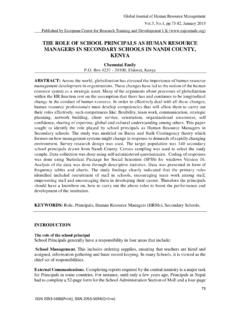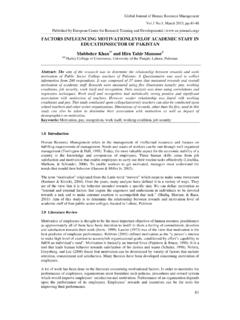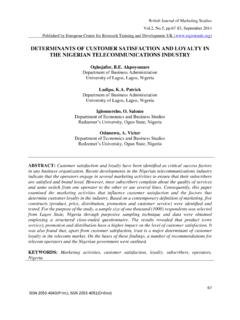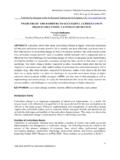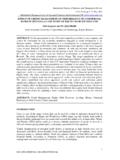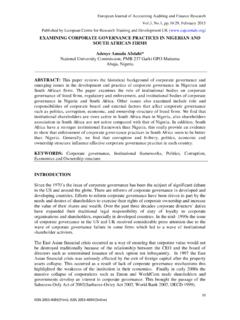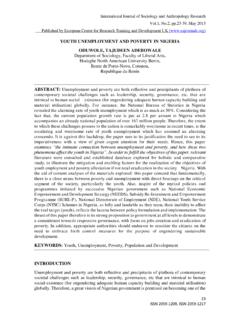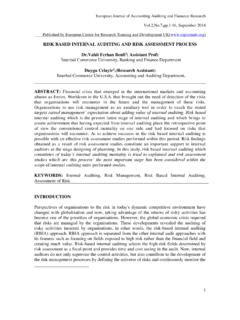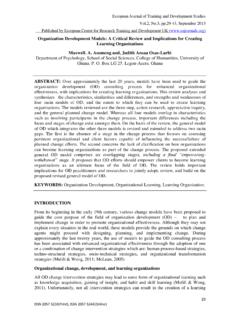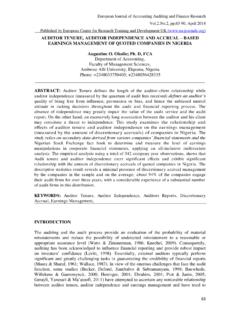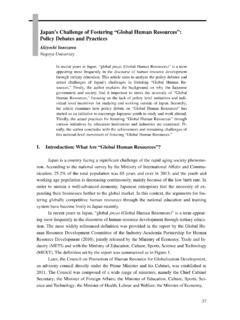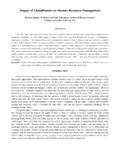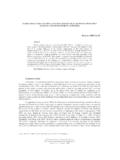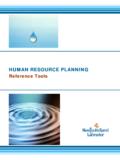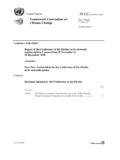Transcription of HISTORY, EVOLUTION AND DEVELOPMENT OF …
1 global Journal of human resource Management , , , May 2015 Published by European Centre for Research Training and DEVELOPMENT UK ( ) 58 history , EVOLUTION AND DEVELOPMENT OF human resource MANAGEMENT: A CONTEMPORARY PERSPECTIVE Kipkemboi Jacob Rotich1, Moi University, School of human resource DEVELOPMENT , Department of DEVELOPMENT Studies, Box 3900-30100, Eldoret, Kenya. ABSTRACT: Various attempts have been made towards tracing the historical DEVELOPMENT of the discipline of human resource Management (HRM). However, these initiatives have largely been concentrated on certain specific periods of time and experiences of specific countries and regions such as Australia, the USA, the UK and Asia (Nankervis , 2011; Kelly, 2003; Ogier, 2003).
2 This paper attempts to document the entire history of the discipline of human resource Management from a holistic perspective. The EVOLUTION and DEVELOPMENT of HRM will be traced right from the pre-historic times through to the postmodern world. Major characteristics in the EVOLUTION and DEVELOPMENT of HRM will also be examined and documented. KEYWORDS: human resource Management (HRM), EVOLUTION , history INTRODUCTION Defining human resource Management (HRM) According to Armstrong (2006) human resource Management (HRM) is defined as a strategic and coherent approach to the management of an organization s most valued assets the people working there who individually and collectively contribute to the achievement of its objectives.
3 From this definition, we can deduce that HRM or simply HR is a function in organizations designed to maximize employee performance in service of their employer s strategic objectives (Johanson, 2009). HR is primarily concerned with how people are managed within organizations, focusing on policies and systems (Collings & Wood, 2009). HR departments and units in organizations are typically responsible for a number of activities, including employee recruitment, training and DEVELOPMENT , performance appraisal, and rewarding ( , managing pay and benefit systems) (Paauwe & Boon, 2009).
4 HR is also concerned with industrial relations, that is, the balancing of organizational practices with regulations arising from collective bargaining and governmental laws (Klerck, 2009) HRM is a product of the human relations movement of the early 20th century, when researchers began documenting ways of creating business value through the strategic management of the workforce. The function was initially dominated by transactional work, such as payroll and benefits administration, but due to globalization, company consolidation, technological advancement, and further research, HR now focuses on strategic initiatives like mergers and acquisitions, talent management, succession planning, industrial and labor relations, ethical considerations, diversity and inclusion.
5 These, among other initiatives contribute to the understanding of human resource Management as a contemporary issue owing to their sustained evolutionary nature. global Journal of human resource Management , , , May 2015 Published by European Centre for Research Training and DEVELOPMENT UK ( ) 59 In this paper, I will discuss the historical DEVELOPMENT of human resource Management (HRM) as a discipline. I will consider its various evolutionary phases outlining the specific characteristics of each phase and the contributions of these characteristics in shaping the DEVELOPMENT of human resource Management as a field of study as well as a profession.
6 Lastly I will provide a summary of key issues that justify human resource Management as a contemporary subject. HISTORICAL DEVELOPMENT OF human resource MANAGEMENT (HRM) Tracing the roots of HRM During pre-historic times, there existed consistent methods for selection of tribal leaders (Jones & Bartlett, 2014). The practice of safety and health while hunting was passed on from generation to generation. From 2000BC to 1500BC, the Chinese used employee screening techniques and while Greeks used an apprentice system ( history of human resource Management, 2010).
7 These actions recognized the need to select and train individuals for jobs. Early employee specialists were called personnel managers (or personnel administrators), and this term is still in use in various discourses. Personnel management refers to a set of functions or activities ( recruitment, selection, training, salary administration, industrial relations) often performed effectively but with little relationship between the various activities or with overall organizational objectives. Personnel management in the United Kingdom and the United States developed earlier than in Australia and Asia Pacific countries in response to their earlier and more widespread adoption of mass production work processes.
8 Power-driven equipment and improved production systems enabled products to be manufactured more cheaply than before. This process also created many jobs that were monotonous, unhealthy or even hazardous, and led to divisions between management and the working class . The concentration of workers in factories served to focus public attention upon conditions of employment, and forced workers to act collectively to achieve better conditions. The Humanitarian, Cooperative and Marxist theories of the early 1900s highlighted the potential conflicts between employee and employer interests in modern industry situations that laid the foundations for the growth of trade unionism and industrial relations systems which are important elements of contemporary HRM (Nankervis (2011))
9 Governments in both the United Kingdom and the United States became involved in these issues and passed a series of laws to regulate the hours of work for women and children, to establish minimum wages for male labour and to protect workers from unhealthy or hazardous working conditions. Australian governments, both state and national, gradually began to follow suit from the early 1900s, although Australia and New Zealand adopted a different system based on conciliation and arbitration rather than mandated conditions.
10 During this period, management theorists in the United States and United Kingdom began to examine the nature of work and work systems, and to develop models based upon emerging psychological and sociological research. The ways in which these theories have developed, and have been applied by both general management and HR professionals, reflect changing attitudes to jobs, work processes and organizational structures. The Classical school (or Scientific global Journal of human resource Management , , , May 2015 Published by European Centre for Research Training and DEVELOPMENT UK ( ) 60 Management , founded by Frederick Taylor, and best exemplified by Henry Ford in his vehicle manufacturing plants) puts its emphasis on the job itself and the efficient adaptation of workers to work processes.
